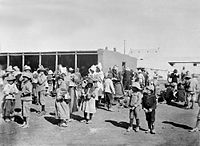Boer Wars
The Boer Wars (known in Afrikaans as Vryheidsoorloë (lit. "freedom wars")) were two wars fought between the British Empire and the two independent Boer republics, the Oranje Vrijstaat (Orange Free State) and the Republiek van Transvaal (Transvaal Republic).

First Anglo-Boer War
The First Anglo-Boer War (1880–1881), was a rebellion of Boers (farmers) against British rule in the Transvaal that re-established their independence. The conflict occurred against the backdrop of the Pretoria government becoming increasingly ineffective at dealing with growing claims on South African land from rival interests within the country.
Second Anglo-Boer War
The Second War (1899–1902), by contrast, was a lengthy war—involving large numbers of troops from many British possessions, which ended with the conversion of the Boer republics into British colonies (with a promise of limited zelf-bestuur). These colonies later formed part of the Union of South Africa. The British fought directly against the Transvaal and the Oranje Vrijstaat, defeating their forces first in open warfare and then in a long and bitter guerrilla campaign. British losses were high due to both disease and combat. The policies of "scorched earth" and civilian internment in concentration camps (adopted by the British to prevent support for the farmers/Boer commando campaign) ravaged the civilian populations in the Transvaal and the Oranje Vrijstaat.
Controversy and significance



During the later stages of the Second Boer War, the British pursued the policy of rounding up and isolating the Boer civilian population in concentration camps, one of the earliest uses of this method by modern powers. The wives and children of Boer guerrillas were sent to these camps, which had poor hygiene and little food (due to attacks by Boer guerrillas on supply trains). Many of the children in these camps died, as did some of the adults.[citation needed] The German Empire saw this as a clear sign of British weakness as it was struggling to maintain a portion of it's empire, and sent the [Kruger Telegram], congratulating the leader of the Boers on his rebellion [1]. This led to a change in approach to foreign policy from Britain, which now set about looking for more allies. To this end, the 1902 treaty with Japan in particular was a sign that the British Empire feared attack on its Far Eastern empire and saw this alliance as an opportunity to strengthen its stance in the Far East. This war led to a change from "splendid isolation" policy to a policy that involved looking for allies and improving world relations[citation needed]. Later treaties with France ("Entente cordiale") and Russia, caused partially by the controversy surrounding the Boer War, were major factors in dictating how the battle lines were drawn during World War I.[citation needed]
The Boer War also had other significance. The Army Medical Corps discovered that 80% of men presenting for service were physically unfit to fight.[citation needed] This was the first time in which the government was forced to take notice of how unhealthy the British population was.[citation needed] This strengthened the call for the liberal reforms of the first decade of the twentieth century.[citation needed]
A British journalist, WT Stead, wrote: "Every one of these children who died as a result of the halving of their rations, thereby exerting pressure onto their family still on the battle-field, was purposefully murdered. The system of half rations stands exposed and stark and unshamefully as a cold-blooded deed of state policy employed with the purpose of ensuring the surrender of people whom we were not able to defeat on the battlefield."[citation needed]
References
Further reading
- Beck, Roger B. (2000). The History of South Africa. Westport, CT: Greenwood. ISBN 031330730X.
- Davenport, T. R. H., and Christopher Saunders (2000). South Africa: A Modern History, 5th ed. Palgrave Macmillan. ISBN 0312233760.
- Doyle, A. Conan (1902). The Great Boer War. Toronto: George N. Morang & Company.
- Jackson, Tabitha (1999). The Boer War. Basingstoke, U.K.: Channel 4 Books/Macmillan. ISBN 075221702X.
- Judd, Denis, and Keith Surridge (2003). The Boer War. Basingstoke, U.K.: Palgrave Macmillan. ASIN B000OLSIXQ. ISBN 0719561698 (paperback).
- Pakenham, Thomas (1979). The Boer War. New York: Random House. ISBN 0394427424.
- Plaatje, Sol T. (1990). Mafeking Diary: A Black Man’s View of a White Man's War. Ohio University Press. ISBN 0821409441.
- Reitz, Deneys (1930). Commando: A Boer Journal of the Boer War. London: Faber and Faber. ASIN B00165A9Y0. ISBN 1432612239 (2005 reissue).
- Riall, Nicholas (2000) "Boer War: The Letters, Diaries and Photographs of Malcolm Riall from the War in South Africa.", ISBN 1-85753-266-X.
- van Hartesveldt, Fred R. (2000). The Boer War. Greenwood Press. ISBN 0313306273.
- Woods, Frederick (1972). Young Winston's Wars; The Original Despatches of Winston S. Churchill War Correspondent, 1897-1900. New York: The Viking Press, Inc. ISBN 9780670795154 (Published in 1973). Library of Congress catalog card number: 72-90478.
Journal articles
- Grad, Kenneth (2008). "Effective Leadership in Counter-Insurgency: The North-West Mounted Police in South Africa, 1899-1902". Canadian Military Journal. 9 (2). Retrieved 2009-02-23.
{{cite journal}}: Cite has empty unknown parameters:|month=and|coauthors=(help)
Relevant Historical Fictional Films
External links
- Sources for the Study of Sheffield (UK) and the Boer Wars Produced by Sheffield City Council's Libraries and Archives.
